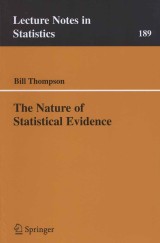Details

The Nature of Statistical Evidence
Lecture Notes in Statistics, Band 189
|
53,49 € |
|
| Verlag: | Springer |
| Format: | |
| Veröffentl.: | 21.12.2007 |
| ISBN/EAN: | 9780387400549 |
| Sprache: | englisch |
| Anzahl Seiten: | 152 |
Dieses eBook enthält ein Wasserzeichen.
Beschreibungen
Our motivation for writing this book was a dissatisfaction with the many books with titles hke Foundations of Statistics. These books provide a needed description of the subject with examples of various statistical methods; but they do not satisfy the discerning reader because they do not explain why certain conclusions may be drawn from certain data and they do not discuss how statistics, the subject, meshes with the scientific process. We naively set out to fill in these gaps, but the situation is not so simple. What is desired is a tool—the one true statistics—which can be applied to data with certainty to justify conclusions, but what is available, in fact, are various competing theories of statistics. The careful reader may correctly point out the relation of this manuscript to po- modem epistemology, a philosophy which emphasizes that all human knowing—in fields as diverse as religion and science—is culture dependent and that therefore "truth" is not absolute. Take, for example, the "truths" of Christianity and Islam— wars have been fought over their differences. In the field of statistics there are, for example, Bayesians and sampling theorists. Carson (2003) states, "Surely it is better, postmodems tell us, to encourage insights that flow from many different perspectives. . . " In statistics, postmodernism is manifest at two levels. First, the findings of statistical applications are not about the true state of nature but about models of experiments on nature.
Overview.- Overview.- The Context.- Mathematics and Its Applications.- The Evolution of Natural Scientists and Their Theories.- Law and Learning.- Interpreting Probability.- to Probability.- The Fair Betting Utility Interpretation of Probability.- Attitudes Toward Chance.- Statistical Models of Induction.- A Framework for Statistical Evidence.- A Critique of Bayesian Inference.- The Long-Run Consequence of Behavior.- A Critique of p-Values.- The Nature of Statistical Evidence.- The Science of Statistics.- Comparison of Evidential Theories.
<P>The purpose of this book is to discuss whether statistical methods make sense. That is a fair question, at the heart of the statistician-client relationship, but put so boldly it may arouse anger. The many books entitled something like <EM>Foundations of Statistics</EM> avoid controversy by merely describing the various methods without explaining why certain conclusions may be drawn from certain data. But we statisticians need a better answer then just shouting a little louder. To avoid a duel, we prejudge the issue and ask the narrower question: "In what sense do statistical methods provide scientific evidence?"</P>
<P>The present volume begins the task of providing interpretations and explanations of several theories of statistical evidence. It should be relevant to anyone interested in the logic of experimental science. Have we achieved a true <EM>Foundation of Statistics</EM>? We have made the link with one widely accepted view of science and we have explained the senses in which Bayesian statistics and p-values allow us to draw conclusions.</P>
<P>Bill Thompson is Professor emeritus of Statistics at the University of Missouri-Columbia. He has had practical affiliations with the National Bureau of Standards, E.I. Dupont, the U.S. Army Air Defense Board, and Oak Ridge National Laboratories. He is a fellow of the American Statistical Association and has served as associate editor of the journal of that society. He has authored the book <EM>Applied Probability</EM>.</P>
<P>The present volume begins the task of providing interpretations and explanations of several theories of statistical evidence. It should be relevant to anyone interested in the logic of experimental science. Have we achieved a true <EM>Foundation of Statistics</EM>? We have made the link with one widely accepted view of science and we have explained the senses in which Bayesian statistics and p-values allow us to draw conclusions.</P>
<P>Bill Thompson is Professor emeritus of Statistics at the University of Missouri-Columbia. He has had practical affiliations with the National Bureau of Standards, E.I. Dupont, the U.S. Army Air Defense Board, and Oak Ridge National Laboratories. He is a fellow of the American Statistical Association and has served as associate editor of the journal of that society. He has authored the book <EM>Applied Probability</EM>.</P>
This book has substantial implications for all users of Statistical methods
<P>This book has substantial implications for all users of Statistical methods. Its purpose is to discuss whether statistical methods make sense. That is a fair question, at the heart of the statistician-client relationship, but put so boldly it may arouse anger. The many books entitled something like Foundations of Statistics avoid controversy by merely describing the various methods without explaining why certain conclusions may be drawn from certain data. To avoid a duel, we prejudge the issue and ask the narrower question: "In what sense do statistical methods provide scientific evidence?" The present volume begins the task of providing interpretations and explanations of several theories of statistical evidence. It should be relevant to anyone interested in the logic of experimental science. Have we achieved a true Foundation of Statistics? We have made the link with one widely accepted view of science and we have explained the senses in which Bayesian statistics and p-values allow us to draw conclusions.</P>

















